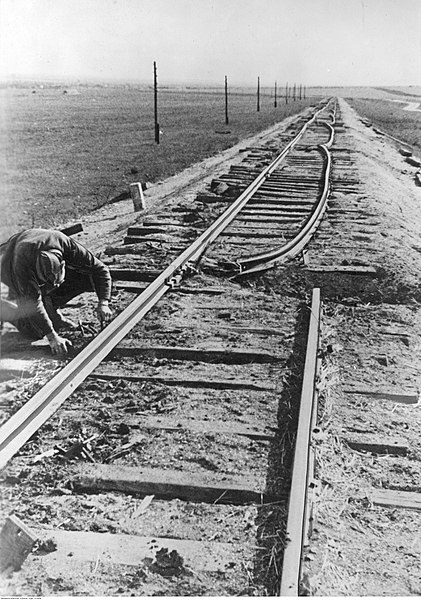I was involved in a discussion on the TimeGhost Army forum on the reasons the Wehrmacht didn’t get as much use out of the existing Soviet railway system to support their forces. I ended up writing enough that I thought it’d be worth pulling together into a blog post. The original question was why didn’t the Germans build new rail lines in Poland to the Russian gauge — which was different enough from the standard 4′ 8 1/2″ gauge used in most of the rest of Europe to help supply their armies.

Example of the damage to Soviet railway lines conducted during the Soviet retreat in 1941.
This photo originally from Wydawnictwo Prasowe Kraków-Warszawa via Wikimedia Commons.
In Christian Wolmar’s Engines of War: How Wars Were Won and Lost on the Railways, he outlines the troubles the Germans faced after launching Operation Barbarossa with regard to logistics on the railway network. Each of the main Germany axes of advance had only one Soviet rail line to provide the bulk of the transport, but the Soviets had successfully withdrawn or destroyed the majority of the locomotives and rolling stock. German industry could have been assigned the task of producing new locomotives to fit the Russian gauge, but re-gauging the existing track was significantly faster.
This meant a significant labour requirement to unload incoming German trains at the furthest point of conversion and re-loading onto the few Russian trains that were able to be put back into service. This was a major task for the German army even before Partisan activity began in earnest. The available coal to fuel the engines in Russia was of inferior thermal quality to the coal the German locomotives were designed to use, so in addition to all the military supplies that had to be carried, the Germans also had to supplement the Russian coal with significant amounts of better coal from elsewhere in Europe.
The next problem didn’t show up until late in 1941, but it was the same problem the fighting troops had to contend with: the Russian winter. Russian railway locomotives were engineered to operate throughout the year, but German locomotives almost never faced the low temperatures that happen in Russia, so any German locomotive allowed to freeze was almost certainly lost to permanent mechanical failure (the locomotive’s entire boiler would need to be replaced, which was not a repair that could be made in the field).
Compounding the problems for the Germany railway troops was that the military planners failed to give the railway troops any priority for supplies and reinforcements, which meant that the higher priority troops (the front-line soldiers) often had to wait longer and/or receive less because the railways weren’t able to repair damaged track or rolling stock or increase the speed of re-gauging the Russian railways.
Somone agreed that these were significant problems for the Wehrmacht, but weren’t they at least somewhat taken into consideration in the planning process:
You’re quite correct that the military planners must have been aware of these issues and a rational army staff would have taken them fully into account in their war plans. It’s possible that they expected to capture a much larger proportion of the Russian locomotives and rolling stock in the initial attacks, but they should have made contingency plans that didn’t absolutely depend on all of them falling into German hands … which is what appears to have been their “plan”.
I agree that it would have been a sensible thing to take into consideration that even if everything went off perfectly – and it never does in wartime – large parts of the German military were going to be staying in Russia for a very long time. Russian winter is, thanks to the historical experiences of Charles XII and Napoleon, proverbial. Hitler’s interventions in the planning process can only account for so much of the irrational optimism: the rest is clearly staff failure at many different levels.
Historical changes of gauge in peacetime have been achieved in amazingly short periods of time … but that was with the advantage of advance planning and having vast numbers of workers available on a tight timetable to get it done. My personal sense (not derived from Christian Wolmar’s book) is that the German military as a whole put too much emphasis on the “teeth” and no where near enough on the “tail” for anything other than a “short, victorious war”.
Railways in North America had certainly tried to adopt as many mechanical aids to track maintenance as they could afford, but I’m not sure if that was equally true of European railways at that time. I recall watching a late 1940s promotional film by one of the “Big Four” British railways showing the innovative way they were now doing track work, and even with some quite modern mechanical aids, there were still dozens of workers clustered around the work (in that time period, not wearing any of what we’d now consider essential safety gear), because labour was still relatively cheap and plentiful.
[…]
There’s a hoary old saying about amateurs plan strategy, but professionals plan logistics. Despite having the benefit of basically inventing the modern military staff system, German plans in WW2 appear in hindsight to be very amateurish once you get to the strategic scale. […] Given the constraints, I think the Germans did far better than they should have done to get as close to Moscow as they did. […] Human psychology plays a large part in explaining both the Germans’ incredible over-confidence (what the Japanese termed “Victory disease”) and Stalin’s willing self-delusion that the Germans wouldn’t attack him while his forces weren’t ready.



